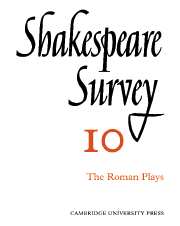Book contents
- Frontmatter
- Shakespeare’s Roman Plays: 1900–1956
- Shakespeare’s ‘Small Latin’—How Much?
- Shakespeare and the Elizabethan Romans
- The Metamorphosis of Violence in Titus Andronicus
- From Plutarch to Shakespeare: A Study of Coriolanus
- The Composition of Titus Andronicus
- Classical Costume in Shakespearian Productions
- Shakespeare’s Use of a Gallery over the Stage
- Lear’s Questions
- “Egregiously an Ass”: The Dark Side of the Moor. A view of Othello’s Mind
- Shakespeare in Schools
- Shakespeare Festival, Toronto, Canada
- International Notes
- Shakespeare Productions in the United Kingdom: 1955
- Drams of Eale, A Review of Recent Productions
- The Year's Contributions to Shakespearian Study 1 Critical Studies
- 2 Shakespeare’s Life, Times and Stage
- 3 Textual Studies
- Books Received
- Index
- Plate Section
3 - Textual Studies
Published online by Cambridge University Press: 28 March 2007
- Frontmatter
- Shakespeare’s Roman Plays: 1900–1956
- Shakespeare’s ‘Small Latin’—How Much?
- Shakespeare and the Elizabethan Romans
- The Metamorphosis of Violence in Titus Andronicus
- From Plutarch to Shakespeare: A Study of Coriolanus
- The Composition of Titus Andronicus
- Classical Costume in Shakespearian Productions
- Shakespeare’s Use of a Gallery over the Stage
- Lear’s Questions
- “Egregiously an Ass”: The Dark Side of the Moor. A view of Othello’s Mind
- Shakespeare in Schools
- Shakespeare Festival, Toronto, Canada
- International Notes
- Shakespeare Productions in the United Kingdom: 1955
- Drams of Eale, A Review of Recent Productions
- The Year's Contributions to Shakespearian Study 1 Critical Studies
- 2 Shakespeare’s Life, Times and Stage
- 3 Textual Studies
- Books Received
- Index
- Plate Section
Summary
Working full time, Dr Henry Howard Furness, the founder of the New Variorum Shakespeare, could at the top of his powers edit a play in three years. His current successors must not only fit their editorial labours into full-time professional schedules but must grapple with a much more formidable volume of commentary and with textual problems of a complexity undreamed of in the leisurely days of Furness. In consequence, they live for many years with their plays and, as in the case of Matthew W. Black with Richard II, achieve an admirable mastery of material and ripeness of scholarship. These qualities are the more desirable because of the editorial necessity to exclude all that is doubtful and to present the rest with severe compression. The only serious loss in the present volume is the skimping of textual and bibliographical material.
- Type
- Chapter
- Information
- Shakespeare Survey , pp. 151 - 158Publisher: Cambridge University PressPrint publication year: 1957

